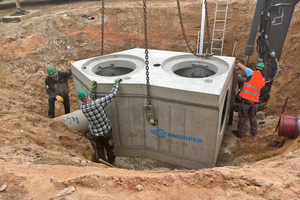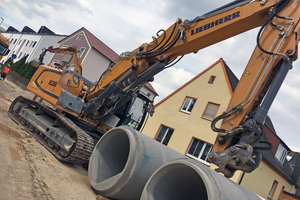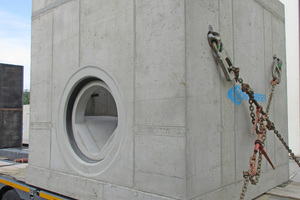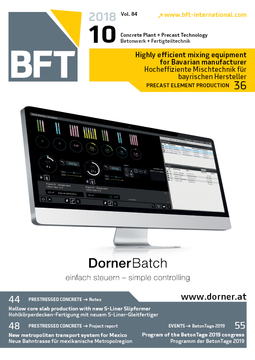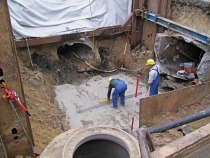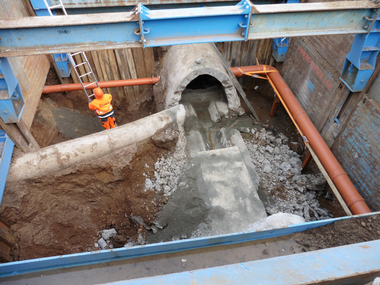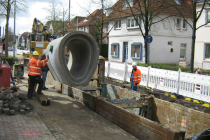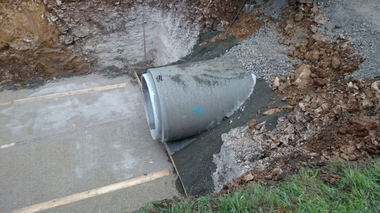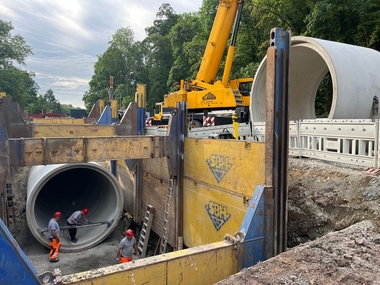Concrete pipes for storage sewer in FBS quality
The city of Neumarkt in the Upper Palatinate region of Germany has a sewer network around 274 km long. This network channels wastewater and rainwater through the Schönmühle wastewater treatment plant into the Schwarzach River. To satisfy the prerequisites for a properly functioning sewer network that can in future continue to receive and discharge all the occurring precipitation, this major district town has been renovating its sewer network for many years. Since the beginning of this year, the responsible departments are now constructing a storage sewer with especially high capacity for which, apart from the 40 m FBS reinforced-concrete sewers with kite-shaped cross-section, six FBS specialized structures have been installed.
The Public Works Department of the city of Neumarkt with about 40,000 inhabitants has been working on improving the hydrotechnical conditions in various areas of the municipality for many years. The recurring problem of backup and impounding problems in the combined sewer was solved step-by-step by enlarging the cross-sections of individual sewer sections. Project planning for rehabilitating the individual sections took place on the basis of the General Drainage Plan from 2009.
Enlargement of cross-sections to ND 800 and/or ND 1400
Until the end of July, the city worked on the renovation of a partial section of the sewer network at Altdorfer Strasse. Previously, sewer pipes with a circular cross-section of ND 300 discharged wastewater and precipitation.
The head of the Municipal Sewer Department, Dipl.-Ing. Ernst Schmidt from Neumarkt, explained the measure: “The condition of this sewer section was absolutely inadequate for managing the precipitation events that are currently occurring with of increasing frequency. Calculations in the general drainage plan for this partial section clearly called for larger cross-sections and increased them from the former ND 300 to the ND 800 and/or ND 1400 installed after the renovation measure. In consultation with the public works department, it was moreover decided to replace the previous circular cross-sections with the largest possible kite-shaped cross-sections for maximum utilization of the impounded volume. With a dry-weather channel of r = 125 to 140 mm and inclined angles of 1:1 up to impost height – as well as rebated and/or bell-and socket joint connections and a bed gradient of throughout 5 ‰ – they ensure that dry-weather operation can essentially take place on a self-cleansing basis. Residue during low water periods can in this way be virtually prevented. These are good conditions for keeping the need for cleaning of the sewer within limits,” explains Schmidt.
Precast construction has time advantages
For this reason, the new storage sewer was implemented over a length of 140 m with reinforced-concrete pipes of ND 800 and ND 1400 with kite-shaped profile. Based on these pipe cross-sections and the resulting impounded volume of 70 m³, a noticeable increase in impounding volume was achieved.
However, the impounding sewer also consists, in addition to the reinforced-concrete pipes, of other structural components, since the dimensions of the pipes of the impounding sewer requires curves and connecting structures. In view of the tight schedule, the municipal planners and the responsible consulting engineering firm Dotzer from Neumarkt had decided on FBS manhole structures of compact design already in the implementation phase. Ernst Schmidt commented as follows: “Installation of the six precast reinforced-concrete components was much faster than in-situ concrete construction, which is a considerable time advantage.
Reinforced-concrete pipes in FBS quality
The reinforced-concrete pipes were manufactured based on FBS Quality Guideline 1-3 “Special Cross-Sections and Special Design of Concrete Pipes and Reinforced-Concrete Pipes in FBS Quality,” with gaskets firmly anchored into the joint in the plant , and the manhole structures based on FBS quality guideline 2-2 “Manhole Structures in Sewers of Compact Design” by Josef Schnurrer GmbH & Co. KG, in Weiden, Germany, a long-time member company of the trade association Fachvereinigung Betonrohre und Stahlbetonrohre e.V. (FBS). Only products bearing the FBW quality mark satisfy these strict quality requirements, which provide for comprehensive in-plant production control. This ensures continuous quality control from the constituent materials to manufacture and to the final product.
Beyond that, a semi-annual quality supervision by officially recognized quality control associations and testing institutes ensures adherence to the high standards.

